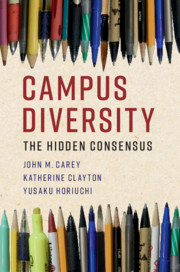PROJECT INFO.
- KEYWORDS: race/ethnicity, gender, immigration, campus diversity, etc.
- COLLABORATORS: John Carey, Katie Clayton, Jeremy Ferwerda, etc.
-
HIGHLIGHTS:
- Campus Diversity: The Hidden Consensus (with John M. Carey and Katherine Clayton). 2020. New York: Cambridge University Press.
- "Disfavor or Favor? Assessing the Valence of White Americans’ Racial Attitudes (with Alexander Agadjanian, John Carey, and Timothy Ryan). Quarterly Journal of Political Science, Vol. 18: No. 1, pp. 75-103, February 2023.
- "Exposure to Immigration and Admission Preferences: Evidence from France" (with Katherine Clayton and Jeremy Ferwerda). Political Behavior, Vol. 43, pp. 175-200, March 2021.
- "Explaining Opposition to Refugee Resettlement: The Role of NIMBYism and Perceived Threats" (with Jeremy A. Ferwarda and D. J. Flynn). Science Advances, 06 Sep 2017: Vol. 3, no. 9, e1700812.
Published Articles
- “Do Identity Frames Impact Support for Multiracial Candidates? The Case of Kamala Harris” (with Katherine Clayton and Charles Crabtree). Journal of Experimental Political Science, Vol. 10, Issue 1, pp. 112-123, Spring 2023.[[SSRN] [DOI] [Replication Package]
- “Disfavor or Favor? Assessing the Valence of White Americans’ Racial Attitudes (with Alexander Agadjanian, John Carey, and Timothy Ryan). Quarterly Journal of Political Science, Vol. 18, No. 1, pp. 75-103, February 2023. [SSRN] [DOI] [Replication Package]
- “Student Attitudes Toward Campus Diversity at the United States Naval Academy: Evidence from Conjoint Survey Experiments” (with John Polga-Hecimovich and John Carey). Armed Forces & Society, Vol. 47, Issue 2, pp. 386-409, April 2021. [SSRN] [DOI] [Replication Package]
- “Exposure to Immigration and Admission Preferences: Evidence from France” (with Katherine Clayton and Jeremy Ferwerda). Political Behavior, Vol. 43, pp. 175-200, March 2021. [SSRN] [DOI] [Replication Package]
- “Who Wants to Hire a More Diverse Faculty? A Conjoint Analysis of Faculty and Student Preferences for Gender and Racial/Ethnic Diversity” (with John M. Carey, Kevin Carman, Katherine Clayton, Mala N. Htun, and Brittany Ortiz). Politics, Groups, and Identities, Vol. 8, Issue 3, pp. 535-553, July 2020. [SSRN] [DOI] [Replication Package]
- “Gender Gaps in Perceptions of Political Science Journals” (with Nadia Brown, Mala Htun, and David Samuels). PS: Political Science & Politics, Vol. 53, Issue 1, pp. 114-121, January 2020. [SSRN] [DOI] [Replication Package]
- “Explaining Opposition to Refugee Resettlement: The Role of NIMBYism and Perceived Threats” (with Jeremy A. Ferwerda and D. J. Flynn). Science Advances, 06 Sep 2017: Vol. 3, no. 9, e1700812. DOI: 10.1126/sciadv.1700812 [URL] [SSRN] [Replication Package] [Press Release]
Also, see:
Japanese Politics
- “Social Contact and Attitudes toward Outsiders: The Case of Japan” (with Yoshikuni Ono). Research & Politics 10(1), January 2023. [SSRN] [DOI] [Replication Package]
- “Susceptibility to Threatening Information and Opposition to Refugee Resettlement: The Case of Japan” (with Yoshikuni Ono). Journal of Peace Research, Vol. 60, Issue 3, pp. 459-473, May 2023. [SSRN] [DOI] [Replication Package]
- “Country Risks and Brain Drain: The Emigration Potential of Japanese Skilled Workers” (with Nana Oishi). Social Science Japan Journal, Vol. 25, Issue 1, pp. 55-82, Winter 2022. [SSRN] [DOI] [Replication Package]
Working Papers
- “Descriptive or Partisan Representation? Examining Trade-Offs for Asian Americans” (with John Cho and Mia Costa). [SSRN] – Under Review, R&R
Also, see:
Japanese Politics
- “Disclosing Invisible Attributes Leads to Discrimination” (with Kai Zhou). [SSRN] – Under Review
Global/foreign public opinion
Work in Progress
- “Analyzing the Effects of Politicians’ Gender and Party Affiliation on Voters’ Opinions” (with Sunny Drescher, Mala Htun, and John Wagner)
- “Engendering Support? The Effects of Gendered Information Cues on Voters’ Policy Preferences” (with Sunny Drescher)
Also, see:
Japanese Politics
- “Disclosing Invisible Attributes is Subject to Discrimination: Conjoint Analysis” (with Kai Zhou)
Book
 Campus Diversity: The Hidden Consensus
Campus Diversity: The Hidden Consensus
John M. Carey, Dartmouth College, New Hampshire
Katherine Clayton, Stanford University, California
Yusaku Horiuchi, Dartmouth College, New Hampshire
Media, politicians, and the courts portray college campuses as divided over diversity and affirmative action. But what do students and faculty really think? This book uses a novel technique to elicit honest opinions from students and faculty and measure preferences for diversity in undergraduate admissions and faculty recruitment at seven major universities, breaking out attitudes by participants’ race, ethnicity, gender, socio-economic status, and political partisanship. Scholarly excellence is a top priority everywhere, but the authors show that when students consider individual candidates, they favor members of all traditionally underrepresented groups – by race, ethnicity, gender, and socio-economic background. Moreover, there is little evidence of polarization in the attitudes of different student groups. The book reveals that campus communities are less deeply divided than they are often portrayed to be; although affirmative action remains controversial in the abstract, there is broad support for prioritizing diversity in practice.
- Provides new, reliable information about attitudes toward affirmative action and campus diversity
- Breaks out attitudes by students’ race, ethnicity, gender, socio-economic status, and political partisanship
- Presents all statistical results graphically
Date Published: December 2019
ISBN: 9781108745307
Reviews & endorsements
- “Scholars seldom study ourselves – we think we know the answers – and it is hard to study complex and ideologically fraught issues – will people say what they really think? Yet Carey, Clayton, and Horiuchi have done both, in a research project as elegantly designed as it is substantively persuasive. We now know what the vague term ‘diversity’ means, who wants it and why – and we are even given reason to believe that Americans can rise above polarized controversy. This is a highly valuable study, for many reasons.” — Jennifer Hochschild, Harvard University
- “This book is a must-read for anyone interested in racial attitudes and political polarization, especially on college campuses. Carey, Clayton, and Horiuchi’s careful experimental approach reveals less polarization than public discourse often assumes, even related to hot-button topics like affirmative action. Highly recommended.” — Natasha Kumar Warikoo, Harvard University
- “Campus Diversity is a must-read for anyone interested in understanding the ever-shifting landscape of the politics of admissions and diversity on college campuses. Carey, Clayton, and Horiuchi use innovative experimental methods in a wide variety of institutional settings to show that millennial and Generation-Z students place real value on diverse learning environments and are willing to make admissions decisions to support these values. Their findings hold the potential to shed considerable light on the future of debates over diversity as the United States of America shifts to becoming a majority-minority nation by 2050.” — Alvin Bernard Tillery, Jr, Northwestern University, Illinois
Media
- “Asian/American studies programmes are key to combating discrimination” (with Charles Crabtree and a team of undergraduate students at Dartmouth). Times Higher Education, July 24, 2021.
- “How the media describes Kamala Harris’s ethnicity doesn’t affect what voters think of her’‘ (with Katherine Clayton and Charles Crabtree). The Washington Post, The Monkey Cage, September 2, 2020.
- “It’s college admissions season, and students are looking for diverse campuses” (with John M. Carey and Katherine Clayton). The Washington Post, The Monkey Cage, April 14, 2020.
- “What do military service members think about diversity — especially gender diversity — in their ranks?” (with John Carey and John Polga-Hecimovich). The Washington Post, The Monkey Cage, May 2, 2019.
- “LSE Students’ Views on Diversity on Campus” (with Katherine Clayton, John Carey, and Simon Hix), the London School of Economics and Political Science, Equity, Diversity and Inclusion blog, June 20, 2017.
- “What Do College Students Really Think about Diversity? We Asked.” (with John M. Carey). The Washington Post, The Monkey Cage, June 5, 2016.

